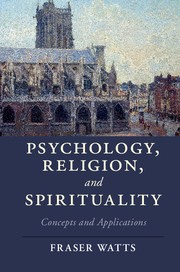Book contents
- Frontmatter
- Dedication
- Contents
- Preface
- 1 Concepts and Approaches
- 2 Psychoanalysis
- 3 Genetics and Evolution
- 4 Brain and Cognition
- 5 Religious Experience
- 6 Religious Practices
- 7 Religious Beliefs and Thinking
- 8 Spirituality
- 9 Developmental Aspects
- 10 Varieties and Types
- 11 Health and Adjustment
- 12 Personal Transformation
- 13 Scripture and Doctrine
- 14 Human Nature and Personality
- 15 Summing-Up
- Further Reading
- References
- Index
1 - Concepts and Approaches
Published online by Cambridge University Press: 31 March 2017
- Frontmatter
- Dedication
- Contents
- Preface
- 1 Concepts and Approaches
- 2 Psychoanalysis
- 3 Genetics and Evolution
- 4 Brain and Cognition
- 5 Religious Experience
- 6 Religious Practices
- 7 Religious Beliefs and Thinking
- 8 Spirituality
- 9 Developmental Aspects
- 10 Varieties and Types
- 11 Health and Adjustment
- 12 Personal Transformation
- 13 Scripture and Doctrine
- 14 Human Nature and Personality
- 15 Summing-Up
- Further Reading
- References
- Index
Summary
Any book on psychology and religion needs to begin by considering what is meant by “religion” and by “psychology.” As it is intended that this book should give more attention than most comparable books to conceptual issues, it is especially important to consider these two key terms. Neither is straightforward. Having done that, we will need to consider ways of bringing them into relation with each other.
What Is Religion?
The concept of “religion” has changed massively over the centuries, and it is really only since the latter part of the nineteenth century that having a religion has come to refer to the extent to which someone adheres to a faith tradition, and to be contrasted with non-religion. Before that, someone's religion (religio) might have been his or her pattern or rule of life. “Religion” is used in this book as a shorthand for “religiosity” or “religiousness” and is contrasted with non-religion.
“Religion” has had slightly different meanings in different cultures and historical periods. In most countries, Christianity is an elective religion, that is, people opt in or out of it. The same is probably true of Western Buddhism. However, most other religions are closely intertwined with cultural identity (rather in the way that being Protestant or Catholic in Ireland is intertwined with cultural identity). To be Jewish, for example, is as much a matter of cultural or racial identity as of what is now thought of as “religion.”
“Religion” also has different connotations in a culture in which everyone is religious, from one in which religion is contrasted with non-religion. The psychological study of religion has largely been carried on in the latter kind of culture, and so the psychology of religion is largely concerned with different aspects of religiousness or “religiosity.”
Though there are many religious traditions around the world, religion has been most extensively studied from a psychological point of view in the United States and in Europe, where Christianity predominates. It has to be admitted that, so far, the so-called psychology of religion is largely the study of American and European Christianity, and mainly Protestant Christianity. There is no reason in principle why it should be limited in that way. In fact, it would greatly enrich the psychology of religion if it included more cross-cultural psychology of religion, and there are promising trends in that direction.
- Type
- Chapter
- Information
- Psychology, Religion, and SpiritualityConcepts and Applications, pp. 1 - 12Publisher: Cambridge University PressPrint publication year: 2017



